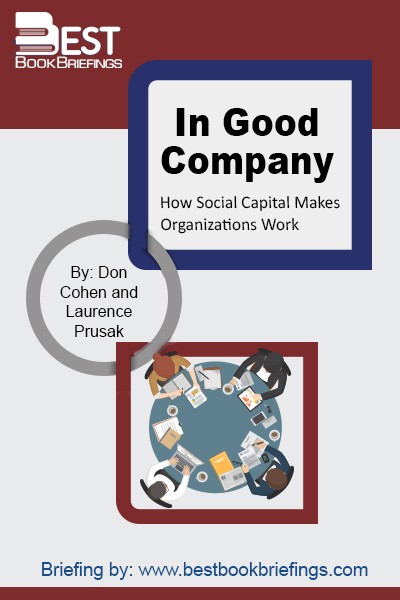In Good Company
How Social Capital Makes Organizations Work
Number of pages: 224
Publisher: Harvard Business Review Press
BBB Library: Operations Management
ISBN: 978-0875849133
Editorial Review
Social capital consists of the stock of active connections among people: the trust, mutual understanding, and shared values and behaviors that bind the members of human networks and communities and make cooperative action possible. It makes an organization, or any cooperative group, more than a collection of individuals’ intent on achieving their own private purposes. The book discusses trust, networks, and communities, social space and time, and communication, and the kinds of benefits organizations can derive from these elements and supports.
Book Reviews
Books on Related Topics

At the heart of every organization chart lies a myth. At the top there’s the boss. Directly beneath are the boss’s direct reports – anywhere from five to fifteen people who meet regularly as the senior team. Whether at the corporate, divisional, functional, or departmental level, this team almost invariably has

Social intelligence is defined as the ability to get along well with others while winning their cooperation. Social intelligence is a combination of sensitivity to the needs and interests of others, which is sometimes called your social radar, an attitude of generosity and consideration, and a set of practical skills for

Perhaps more than any of the other dysfunctions, the leader must set the tone for a focus on results. If team members sense that the leader values anything other than results, they will take that as permission to do the same for themselves. Team leaders must be selfless and objective and

This work exposes the biggest challenge in leadership. The authors look at what conspires against a culture of candor in organizations to create disastrous results, and suggest ways that leaders can achieve healthy and honest openness.

In this leadership book, 42 Rules for Creating WE offers new insights from thought leaders in neuroscience, organizational development, and brand strategy, introducing groundbreaking practices for bringing the spirit of WE to any organization, team or cause.

If you are a supervisor or a team leader, you know how difficult it is to run a unit or a team. You’ve the one job where everyone seems to give you a hard time; management demands improved performance, employees want you to solve their problems, other units need you to



